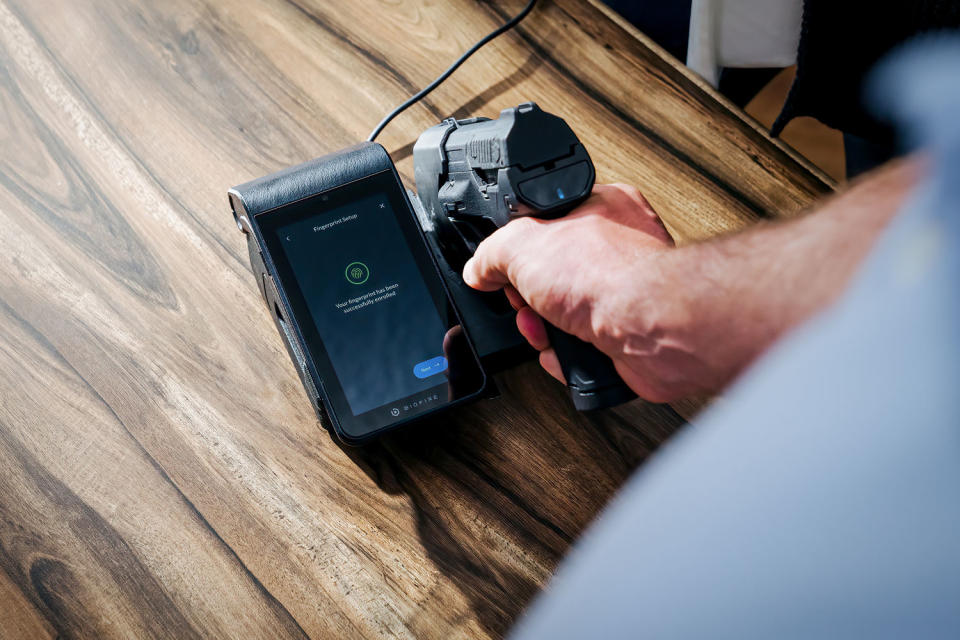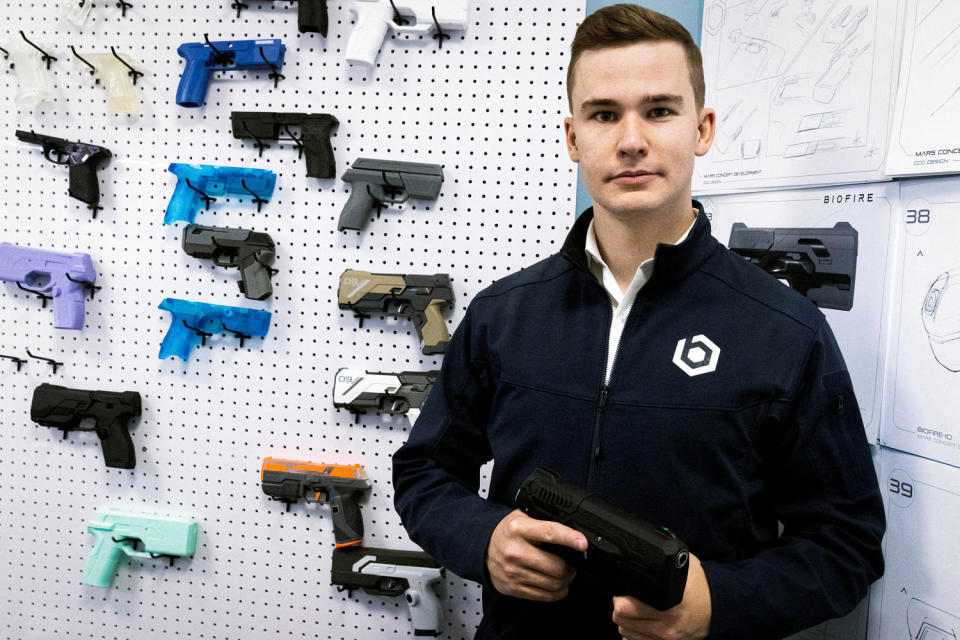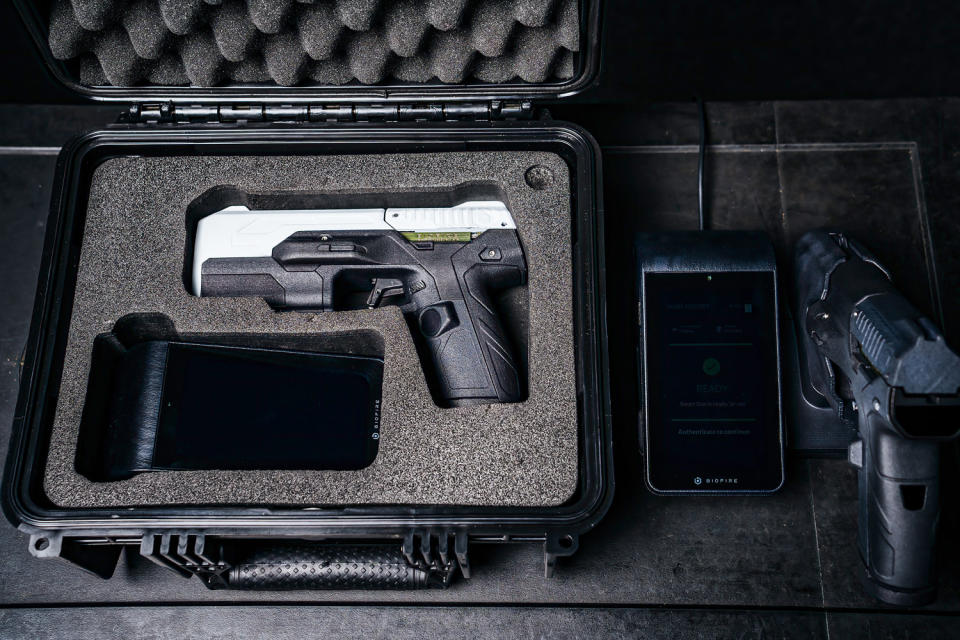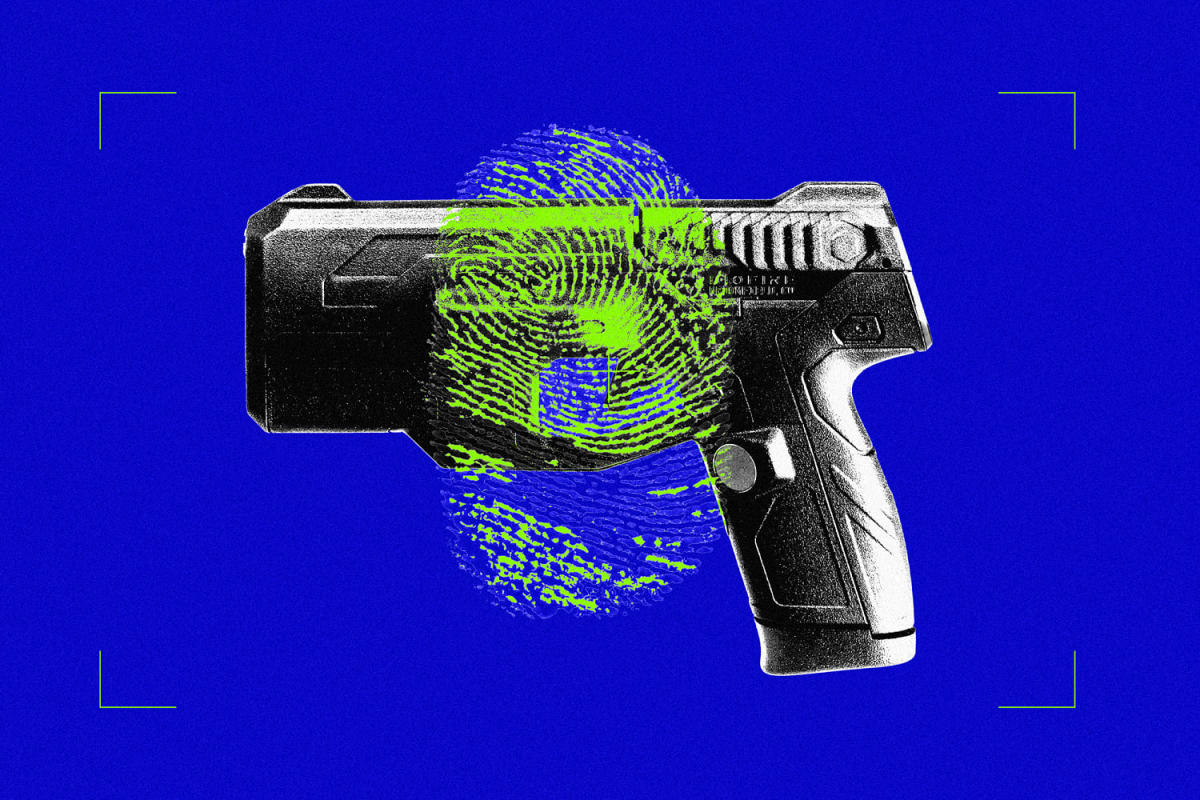After decades of failed attempts by other manufacturers to bring a reliable smart gun to market, Biofire, a Colorado-based startup, says it’s shipping its first batch of 9 mm handguns equipped with fingerprint and facial-recognition technology by the end of the month. The company’s smart gun is designed to serve a very specific purpose: a weapon that can be quickly accessed to defend against a home intruder, but that can’t be used by anyone unauthorized, particularly children.
As Biofire markets its gun to firearm enthusiasts and skeptics alike, the company is walking a careful line to avoid the massive blowback from the gun-rights movement that derailed previous iterations of smart guns.
For more on this story, watch “Hallie Jackson Now” on News Now at 5 p.m. ET.
Gun control advocates have long seen biometric technology as a game changer for reducing gun violence, and Biofire has drawn their praise by emphasizing safety and the need to prevent children from accessing guns. At the same time, the company has built ties with the gun industry and opposes any government mandates to require biometric features in guns, trying to head off fears that the technology is a Trojan horse for gun control.
So far, Biofire’s approach has been received with a mix of cautious optimism, curiosity and distrust. But the most important question won’t be fully answered until the gun is in people’s hands: Does it really work?
“I don’t want to be the first guy to find out,” said Pierre Salomon, who runs a firearms training company in Massachusetts. “I don’t think the technology is there for me to be putting my life on the line — and my family’s life on the line.”

Kai Kloepfer, the company’s CEO and founder, says its $1,499 gun is reliable and thoroughly tested. More than twice as expensive as a typical handgun, it isn’t just a standard firearm with biomechanical sensors affixed. When an authorized user pulls the trigger, it sends an electric signal to fire the bullet, rather than rely on a physical trigger mechanism — the first gun ever designed to fire that way, the company says.
“It’s just a very, very different approach and one that has involved rigorous testing and validation of every single piece of the system,” said Kloepfer, who compares the complexity of his product to a “small satellite.”
Kloepfer began trying to develop a smart gun as a high school student who had been rattled by the 2012 Aurora, Colorado, theater shooting. He dropped out of the Massachusetts Institute of Technology to focus on the product, ultimately raising more than $37 million in venture capital and private funds.
Biofire says its first batch of smart guns will go to investors, friends and others in the firm’s inner circle this month. In the following months, Biofire’s first paid customers — who number in the “thousands,” the company said, declining to be more specific — will be receiving their orders. Biofire said roughly a third of them are first-time gun owners.
The gun is designed to allow up to five authorized people to fire the weapon instantly upon gripping it, and to disable the trigger mechanism the moment it leaves their hand. That should help prevent unintentional shootings by children, as well as teen suicides, theft and criminal use of the weapons, Kloepfer said.
“It’s unfortunately common that a kid finds a gun in a purse, or a kid finds a gun in a drawer and plays with it,” Kloepfer said.
The biometric technology won’t work if users’ faces and hands are completely covered, but Biofire says that shouldn’t be a problem, since it’s meant to be used at home. The company’s website shows the gun stored on a bookshelf behind a family watching TV and above a kitchen counter with kids nearby.


There are no federal product safety regulations for any firearms, including Biofire’s gun, due to a carveout in the 1972 consumer protection law, and there are no industry standards for testing biometric weapons. Biofire’s smart gun meets safety requirements for consumer electronics, as well as handgun safety standards that some states have established, the company said.
Kloepfer added that Biofire’s fingerprint and facial-recognition sensors are designed to be far more reliable than a smartphone; people typically grip a weapon in a more consistent position that makes it easier to unlock accurately through fingerprints or facial capture. The product has undergone rigorous testing under conditions including a wide range of temperatures and sweaty palms, and has a battery that can last months on a single charge, he said.
The promise of this technology has led many safety advocates to champion the development of smart guns as a critical breakthrough for reducing gun injuries and deaths.
At a primary debate in 2019, Joe Biden declared that “no gun should be able to be sold unless your biometric measure could pull that trigger.” The website for his 2020 presidential campaign included a call to “put America on the path to ensuring that 100% of firearms sold in America are smart guns,” without specifying how that would be achieved.
Nick Suplina, senior vice president for law and policy at Everytown, a gun control advocacy group, sees Biofire as a potential step in that direction.
“This could be the beginning of everybody opting in on safer firearms,” Suplina said. “As Biofire enters the marketplace, there is going to be pressure on other manufacturers to create similar products.”
Leading gun-rights advocates have not embraced Biofire’s smart gun with the same enthusiasm. Instead, they have stressed that they do not oppose smart gun technology itself, but rather any government plan to use it as a means to control which types of guns can be sold.
Some have also raised the concern that smart guns could be disabled remotely, including by the government. Biofire says remote access to its gun is not possible.


Aidan Johnston, director of federal affairs for Gun Owners of America, a gun rights group, said these and other concerns will lead a lot of gun owners to be “extremely skeptical” about smart guns. “What these so-called smart guns do is lock your firearm so it’s inaccessible in certain situations when you’re going to want it — like a life-or-death situation,” he said.
Gun-rights activists helped shut down the last major attempt to sell a smart gun in the U.S. in 2014, when a German company called Armatix introduced a gun equipped with radio-frequency technology that used a specialized wristband to authorize users. The NRA and others tested the weapon and criticized it for technical flaws including misfires and unlocking without authorization; Armatix denied that there were any problems. After a Maryland gun store announced that it would stock the product, the store’s owner faced protests and death threats.
The backlash was linked, in part, to a New Jersey law that required all of the state’s gun dealers to switch their entire handgun inventory to smart guns after they became commercially available anywhere in the U.S. Retailers scrapped their plans to sell the Armatix weapon, which never became available for sale in U.S. gun stores, and the company later filed for bankruptcy.
New Jersey eliminated its requirement for smart-gun-only inventories in 2019, after state lawmakers acknowledged the effort had unintentionally backfired. The state replaced it with a new requirement for all dealers to stock smart guns as an option for customers when they become available.
Biofire has gone out of its way to avoid Armatix’s fate, joining with every major gun-rights group in opposing New Jersey’s new requirement, arguing that the choice should be up to individual retailers. The company has not submitted paperwork for its product to be evaluated by the state, as Biofire doesn’t want New Jersey gun shops to be required to sell its weapon. For now, all sales go through Biofire’s website.
It remains to be seen whether there’s a broad market for Biofire’s product — or any smart gun. Kloepfer believes there’s a large appetite for a “home defense handgun” and wants to provide more affordable offerings over time.
While noting Biofire’s steep price tag, KiOwana Phillips, an active-duty Army sergeant major who also runs a firearms training business in North Carolina, said she can see the appeal of biometric security features to help protect her 10-year-old at home. The Biofire gun could be more immediately accessible for emergencies while remaining secure, she said, compared to her traditional gun safe and cable locks that would take more time to open.
“I would like to know — and test it for myself to see if it actually works,” Phillips said. “I would personally like to try it.”
This article was originally published on NBCNews.com
